Bronze Age pros recall the publisher’s 1970s turning point…
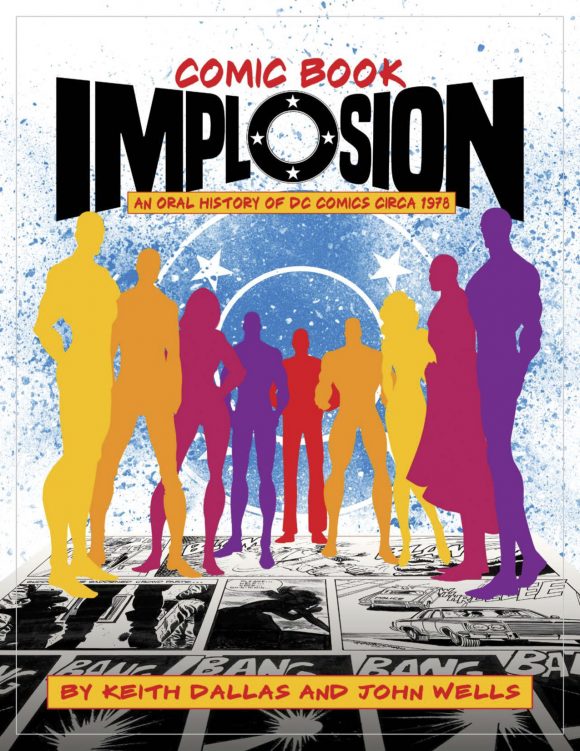
—
UPDATED 9/2/23: This year marks the 45th anniversary of 1978’s infamous DC Implosion. Perfect time for this “reprint” — an excerpt from Keith Dallas and John Wells’ superb Comic Book Implosion, from TwoMorrows. We serialized the book in three parts in 2018 and links to the other installments are below. The book is out of print but is still available digitally from TwoMorrows. Click here to order. Dig it. — Dan
—
Using a combination of new and previously published interviews, Comic Book Implosion, by Keith Dallas and John Wells, chronicles DC Comics’ triumphs and travails in the second half of the 1970s – a crucial time in the publisher’s history.
We’re serializing excerpts from the oversized, 136-page softcover – available now from publisher TwoMorrows – focusing on what happened before, during and after what’s called the DC Implosion, when, in 1978, the company suffered enormous cutbacks in titles and manpower in an effort to stay afloat.
In the first segment, published last weekend, we focused on the rise of DC’s Dollar Comics, one of the most significant publishing initiatives before the Implosion. (Click here.) Now, we take a look at the impact of the Implosion itself – from the perspective of the very comics pros who were directly affected by the broad cuts.
The driving forces for the cutbacks? Demands by Warner Communications executives and a massive winter storm that devastated delivery over the previous winter…
—
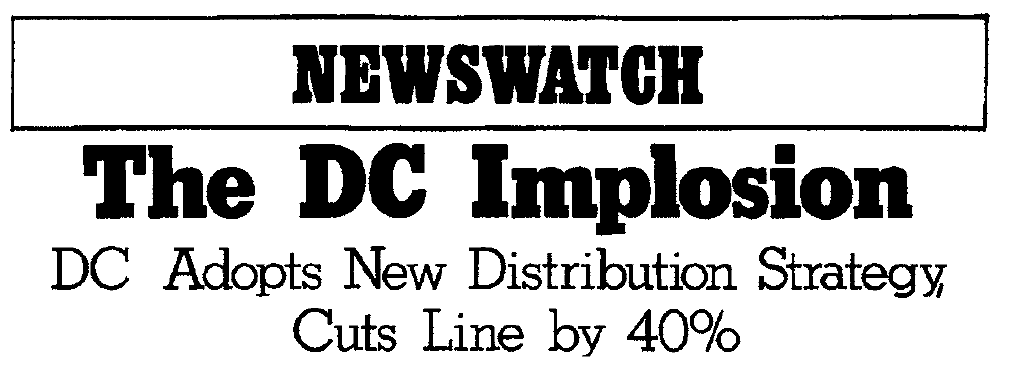
From The Comics Journal #41
Lead story of the “Newswatch” section in The Comics Journal #41 (August 1978):
In an unprecedented move that has caused waves of shock and consternation to ripple throughout the comics industry, DC Comics has initiated a massive cutback by cancelling 17 titles and postponing indefinitely four new titles already scheduled for publication. In addition to this, DC has laid off five full-time staffers, and has changed its 50¢/25-page story format to a 40¢/17-page story format.
DC has cancelled Army at War, All-Star Comics, Batman Family, Battle Classics, Black Lightning, Claw, Doorway to Nightmare, Dynamic Classics, Firestorm, House of Secrets, Kamandi, Our Fighting Forces, Secrets of Haunted House, Showcase, Star Hunters, Steel, and The Witching Hour. Demand Classics, The Deserter, The Vixen, and Western Classics, all highly touted books for summer release, will not appear. Mike Grell’s Starslayer, and the [Martin] Pasko-[Joe] Orlando Swamp Thing revival, both in the planning stages, have been shelved.
—
Mike Gold, then DC Comics public relations representative, in a July 1978 interview printed in Mediascene #31:
It all starts with our yearly budget review meeting, which is held six months after our annual budget meeting. One gives you the money, and the other checks to see how you’re spending it. In six months, anything can happen, and this time it did. What we saw in May was the result of this winter’s blizzard, and things just sort of rolled along from there, out of DC’s control. To be honest, however, what happened was not solely in response to these figures, but more due to the patterns which have been developing over the past several years…
—
Mike W. Barr, then DC Comics staff proofreader in an article printed in Back Issue #2 (February 2004):
Jack C. Harris entered my office and closed the door. Jack thrust out his right hand and I automatically rose and shook it, without knowing the occasion. “Congratulations,” Jack said. “We get to stay.” I had met Jack when I had begun work at DC in September of the previous year, and though we weren’t close friends, we shared several enthusiasms such as DC Silver Age comics. I had even done a little writing for him. Though I saw a lot of Jack every day—his office was right next to mine as DC proofreader and general man-of-all-work—for him to close the door before he spoke was both unique and a trifle ominous; now I knew why.
I had known — as had the entire office — that Something Was Up. Rumors had drifted down that the higher-ups of Warner Communications, Inc., DC’s parent firm, were unhappy with DC’s performance and were determined to take further action…
When the Implosion fell, I and other DC staffers were given a list of freelancers whose assignments had just been cancelled with orders to tell them to stop work immediately. Even I knew that was nothing more than a signal to a freelancer to pull an all-nighter to finish the assignment before delivery. Amazing how many freelancers I contacted had finished the jobs they were working on just before I told them to quit. But… “We get to stay”? I hadn’t known things were that bad.
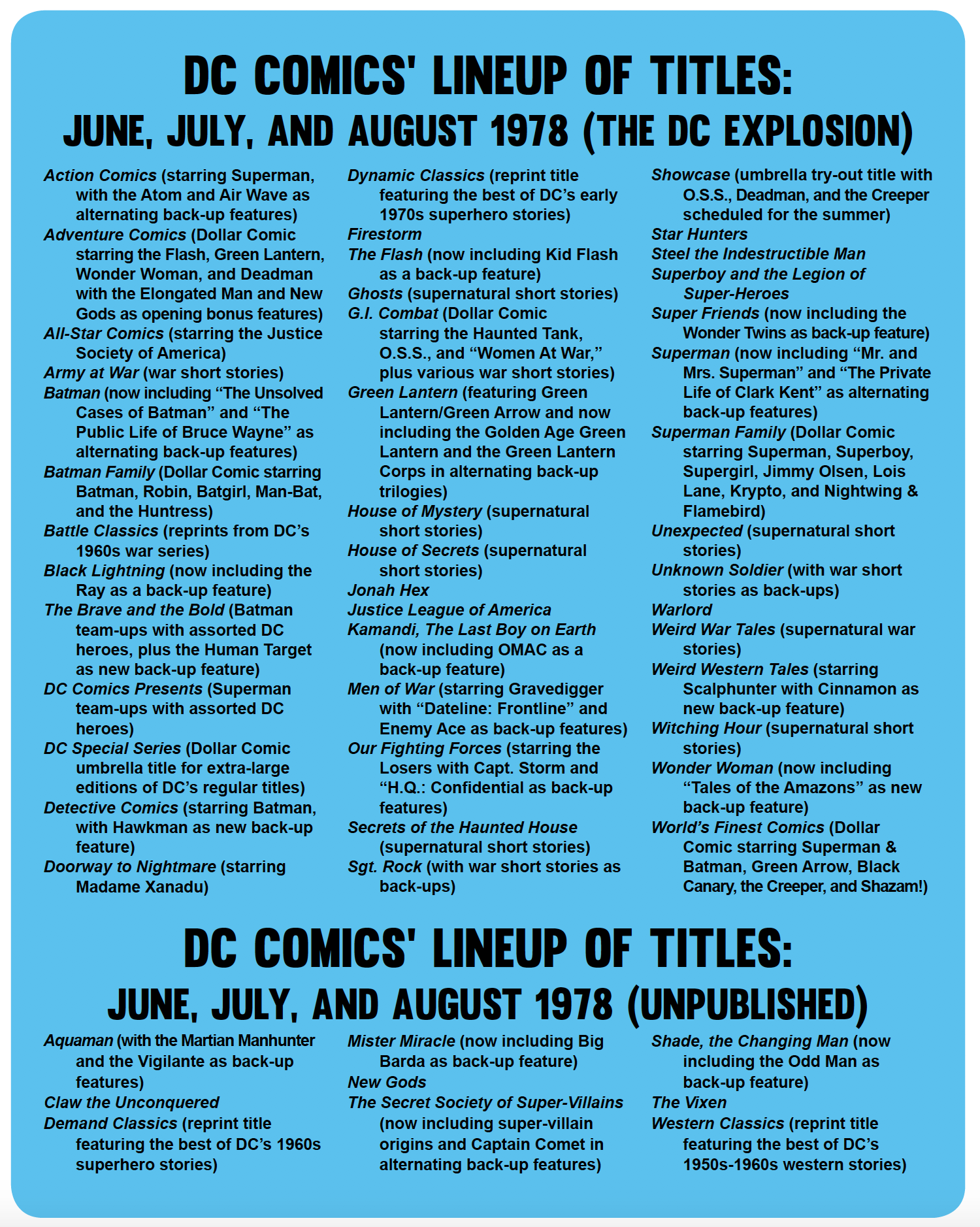
Alex Saviuk, then artist of Green Lantern in an interview printed in The Flash Companion (2008):
“I heard about the Implosion. They said there was going to be a big shake-up, a lot of books were going to get cancelled, people were going to get let go, etc. And I’m thinking, ‘I’ve only been in the business like a year. Things don’t look so good. What am I going to do? Maybe this would be a good time to go to Marvel.
But Jack C. Harris had just taken over editorship of the Green Lantern book, and he called me up personally and said, “Listen, we had the Implosion in here, and lots of people were let go, primarily the new freelancers, but of all the new freelancers that we kept, you’re the only one.” And I said, “Really!?” And he said, “Yeah, and I’m thinking I want you to continue on the Green Lantern book.”
Mike W. Barr, then DC Comics staff proofreader in an article printed in Back Issue #2 (February 2004):
Morale around the office couldn’t help but be affected by the demands of the Implosion. Part of this had to do with those dismissed. Al Milgrom, for example, was easily the most informal and fun of all the DC editors. His door was always open to shoot the breeze for a few minutes to take the edge off a hectic day (barring fire, flood or deadline, of course) and, as an excellent artist, he was always available for an emergency art correction too complicated to be trusted to the Production Department. …
The DC offices, whose mood was casual without being relaxed, became even more rigid, more “businesslike.” A long-standing custom, the monthly bagel “birthday party,” was done away with. … You got the impression that some people liked it that way, not realizing that a disciplined, dignified, austere comic-book office is a contradiction in terms.
Even DC traditions of decades’ standing threatened to be altered by the Implosion. Detective Comics, one of DC’s oldest, yet lesser-selling titles, was cancelled, while Batman Family, a Dollar Comic, was left intact. It was decreed this would not stand, and Detective was revived as a Dollar Comic, “featuring the Batman Family.” Kudos to those who kept alive the title from whose initials DC Comics took its name, largely Paul Levitz, [then the] new editor of the Batman titles.
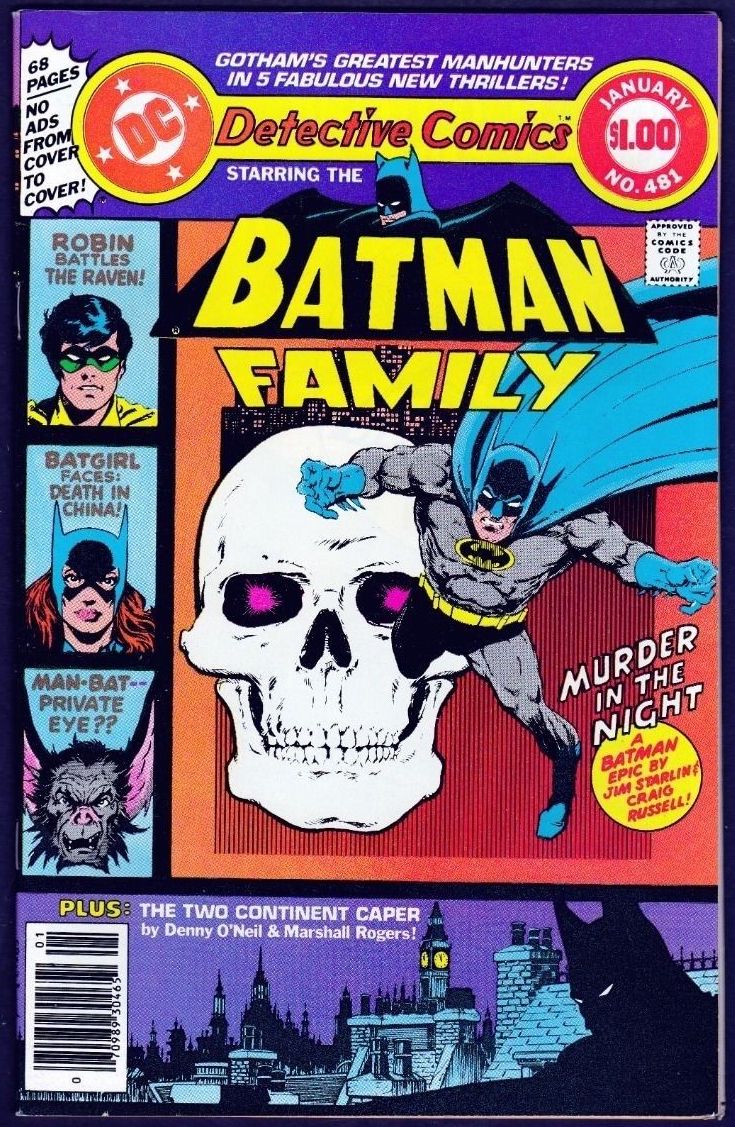
The first issue of the merged Detective Comics and Batman Family
Paul Levitz, then DC Comics editorial coordinator, in an interview at 13th Dimension in 2015:
“There was about a day or two in there where we were talking about cancelling Detective. I think actually it was Mike Gold who very passionately rose to its defense, pointing out that that’s what the company was named after and we couldn’t do that so… The book would have pretty much been the same book either way but certainly it was a better thing historically to keep the Detective name alive. We owe a debt to Mike for that.” (Click here for more from this interview with Levitz.)
—
Jenette Kahn, then DC Comics publisher in an interview printed in Back Issue #57 (July 2012):
What I remember most of all, truthfully, is that because of the Implosion, we had to let people go. I was very happy to have Larry [Hama] and Al Milgrom on staff and it was painful to have to release them. We couldn’t afford to keep them with the sales being nothing what we hoped for. Quite the contrary. And so most of all, I remember, really, the human toll of that time period.
Jim Shooter, then Marvel Comics editor-in-chief in a July 1978 interview printed in Mediascene #31:
The day after the cutback, I had DC people lined up in the hall waiting for work from Marvel.
Neal Adams, then head of Continuity Associates in a July 1978 interview printed in Mediascene #31:
There must have been around 30 people turned out, and we had to find work for them at Marvel, Continuity, wherever.
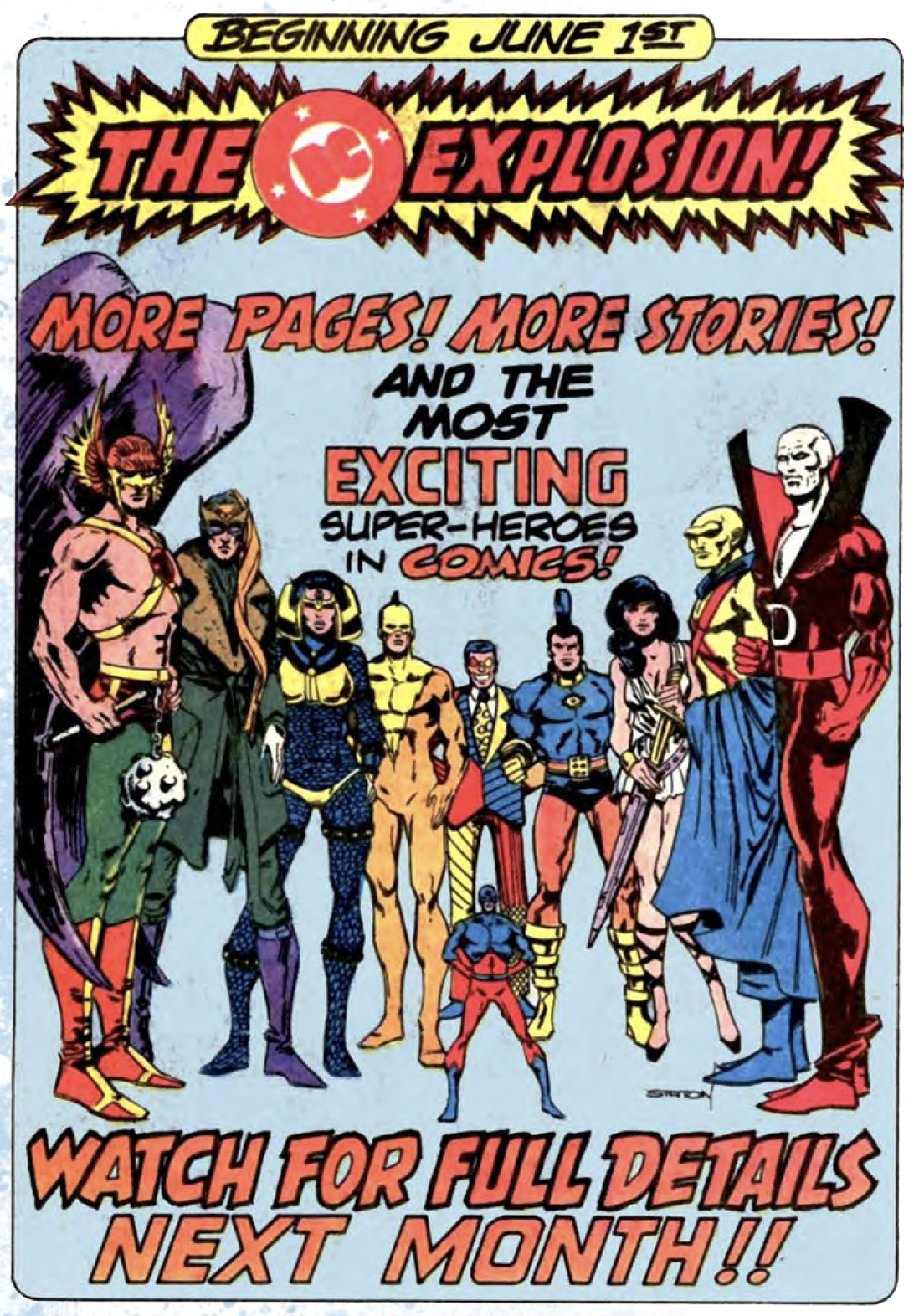
In April 1978, a full-page Joe Staton illustration heralded the DC Explosion with an array of heroes slated to receive their own features in existing books. By the time the ad saw print, though, DC had already decided to cancel several of the titles intended for the Explosion. They joined other recently terminated books in limbo.
Al Milgrom, then DC Comics editor in an interview posted at The Silver Lantern in 2010:
When [DC Comics] said, “Good-bye,” I said, “Okay, back to freelancing,” and I went over to Marvel and actually said, “Hey, DC fired me. Any chance of getting some freelance work?” And DC, by the way, at the time said, “Hey, you guys get first priority in terms of freelance.” But nobody offered me any work up there at the time. I didn’t really go actively looking for it, but nobody came down to my office and said, “Hey, Al, before you leave, you want to become the inker on this, or pencil this or that?” And probably the truth is, with the cutbacks, they may not have had work available and would have had to can somebody else to give us work. Can freelancers, that is. So I never really thought much about it. I went back to Marvel and said, “Hey, any chance of me getting some more work here?” And Jim Shooter said, “I think we might have something for you. “Great.”
That same day somebody gave me some Star Wars pages because it was in a bind, and I thought, “Okay.” I thought they were going to offer me a book or two, but Jim, who was newly minted as the Editor-in-Chief, offered me an editorial position and I thought, “Well, I don’t think I really got the full impact of the job after only one year [at DC],” so he convinced me to take it, so I proceeded to work as an editor for Marvel for five years… (Click here for more from the interview.)
—
Larry Hama, then DC Comics editor in an interview printed in David Anthony Kraft’s Comics Interview #38 (1986):
Al and I were imploded simultaneously. We were the last hired so we were the first imploded. (Laughter.) I just rebounded to Continuity. Al came pretty much straight over to Marvel. After about, I don’t know, six or eight months, Al called me and said, “Hey, look, they’re talking about revamping Crazy. Why don’t you come over and have lunch?” And so I came over and talked to Al and talked to Shooter and came up with a game plan and dived right into doing a funny book. That was really — when I was a kid I had been a Mad freak — that was really one big fantasy fulfilment, to run Crazy.
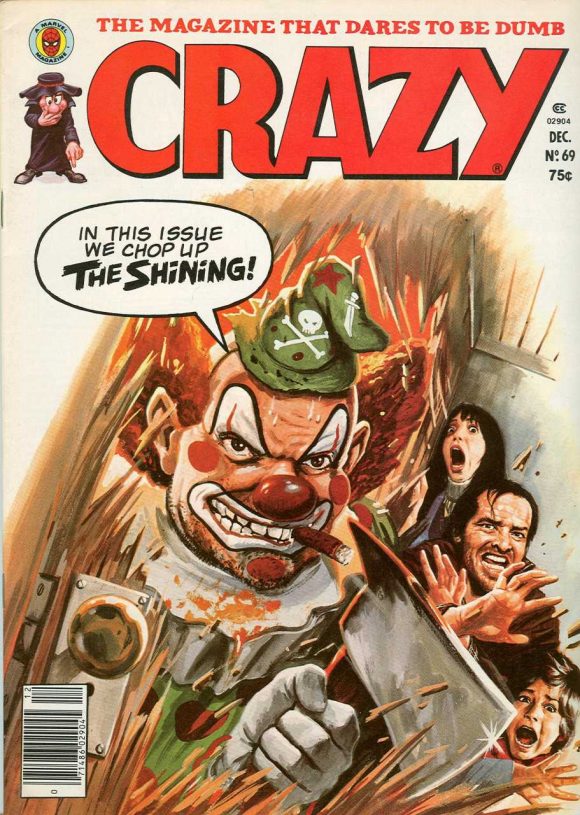
After taking over Crazy, Larry Hama introduced a vulgar new mascot called Obnoxio the Clown (as seen on Bob Larkin’s cover for Issue #69).
[Freelancers such as Michael Golden, Tom DeFalco and Roger McKenzie, and artists Frank Miller and Jerry Bingham — whose earliest DC work saw print during mid-1978 — also picked up assignments at Marvel. Newcomer J.M. DeMatteis— whose first script was published in August’s Weird War Tales #70—managed to pick up regular assignments from DC over the next two years, initially for anthology titles but ultimately on secondary features like Hawkman, Red Tornado, and his own creations, the Creature Commandos and I…Vampire, before moving to Marvel in 1980.]
—
Mike W. Barr, then DC Comics staff proofreader in an article printed in Back Issue #2 (February 2004):
News of the DC Implosion was greeted with crocodile tears or indifference by most of the rest of the comic-book business. Warren and Western’s [readers] had little overlap with DC’s audience, and even less with DC’s freelancer pool. The majority of editors and personnel of Marvel felt for the DC employees who had suddenly been let go, but the public face of Marvel’s response—and the remarks of some Marvel staffers, always in hearing of their superiors—to DC’s dilemma was basically “more [market share] for us.”
The summary cancellation of a number of DC’s titles was positioned by Marvel as a judgment of the quality of those titles, and of DC in general, which was an unfair verdict. Those DC titles that had “exploded” hadn’t been on sale long enough to generate sales figures.
Some at Marvel even took glee in the fact that Marvel now had a much deeper and wider talent pool to dip into, apparently never stopping to wonder if the bell would toll for them, too, if Marvel’s owners might wake up one morning and decide that Warner Communications had had the right idea.
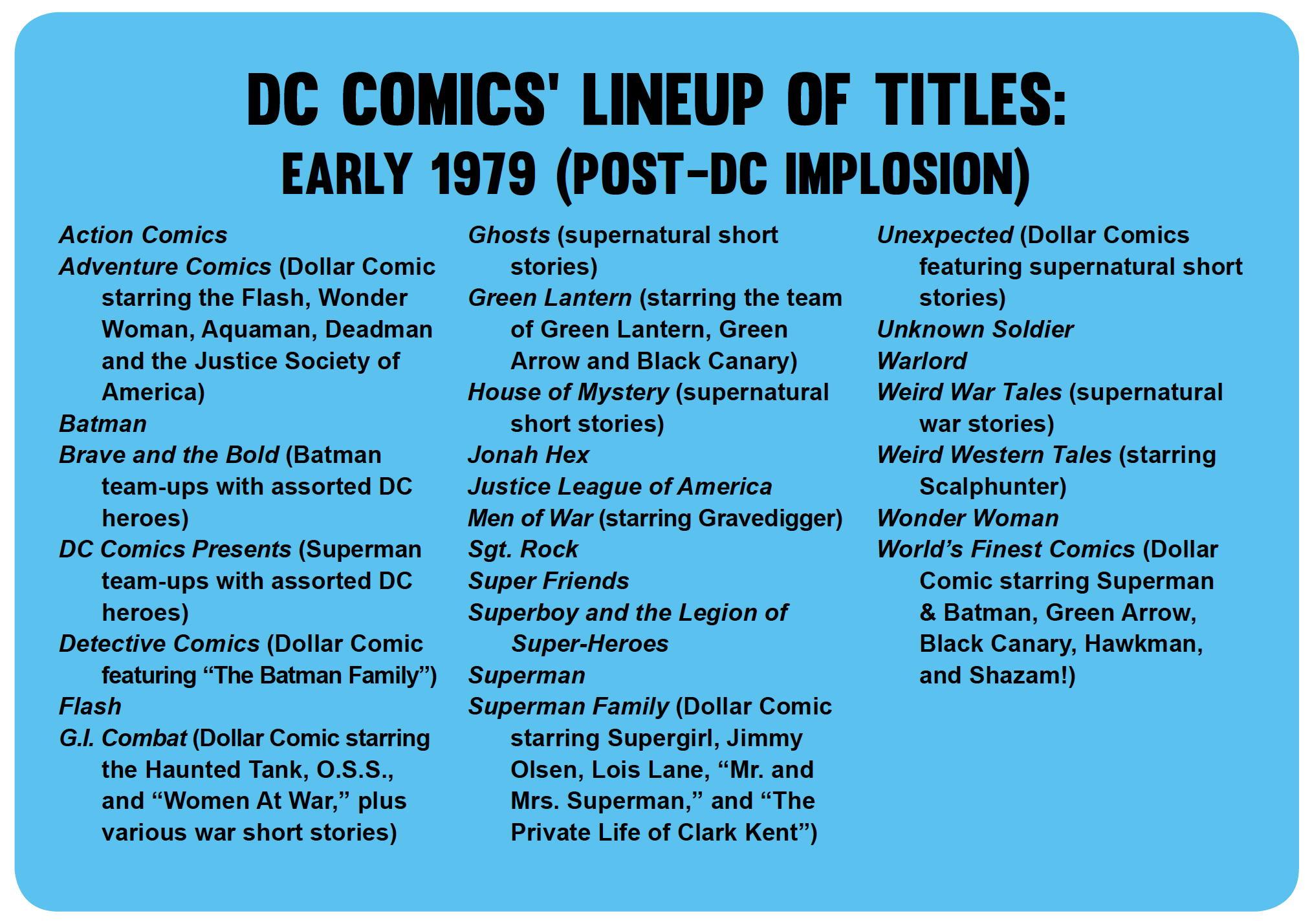
—
MORE
— BEFORE THE IMPLOSION: The Rise of DC’s Dollar Comics. Click here.
— AFTER THE IMPLOSION: Cancelled Comic Cavalcade. Click here.
— THE PAUL LEVITZ INTERVIEWS: Becoming Gotham’s Guardian. Click here.
—
Comic Book Implosion is a 136-page, oversized, illustrated trade paperback that lists for $21.95. It’s available in comics shops, online retailers and through TwoMorrows directly. (Click here to order from TwoMorrows.)

July 28, 2018
Great post! 🙂
August 2, 2018
I’ve now read about halfway through the book. It’s a great book. You might think it’s awfully specific to a particular situation only relevant to a time period 40 years ago, but what is apparent in retrospect is that the period of 1976-78 represented a tipping point at which the market began shifting from away newsstand distribution to direct distribution. It’s exactly the halfway point between the boom-and-bust cycle of “Batmania” (1966-68) and the emergence of direct-market-only landmarks like DARK KNIGHT and WATCHMEN (1986-88). What that really meant is that comic books ceased to be a mass-medium, and became a niche medium marketed towards (and both created and read by) fans & collectors — and it all happened because the format/page count/cover price of comic books hadn’t kept pace economically with general interest magazines, which meant that general retailers were less inclined to carry them because of the amount of display space required and the low profit-per-copy involved.
August 2, 2018
Couldn’t have said it better myself.
August 7, 2022
You would have to have a tone-deaf editorial staff to launch 10 war books five years after the end of the Vietnam War. The same thing with 8 supernatural books with no weird heroes. The same thing with 8 repetitious Superman Family books. Notwithstanding launching any book cursed with DC bad luck stars like Ditko, Kirby and Liefeld!
September 2, 2023
What Warner was dealing with back then in terms of DC’s sales was so much better than what they have today. Little did they realize what was to come.
September 3, 2023
It is a brilliant book